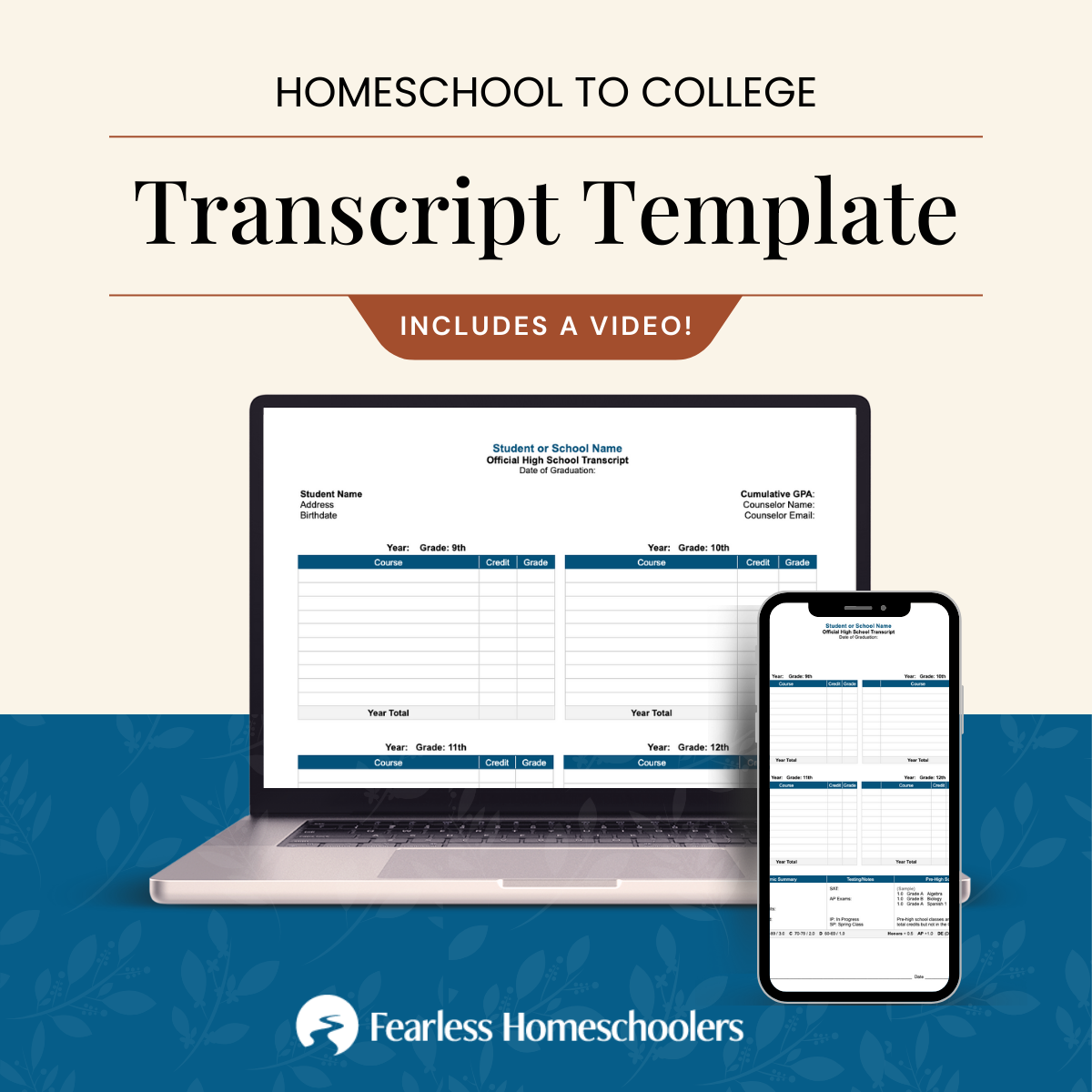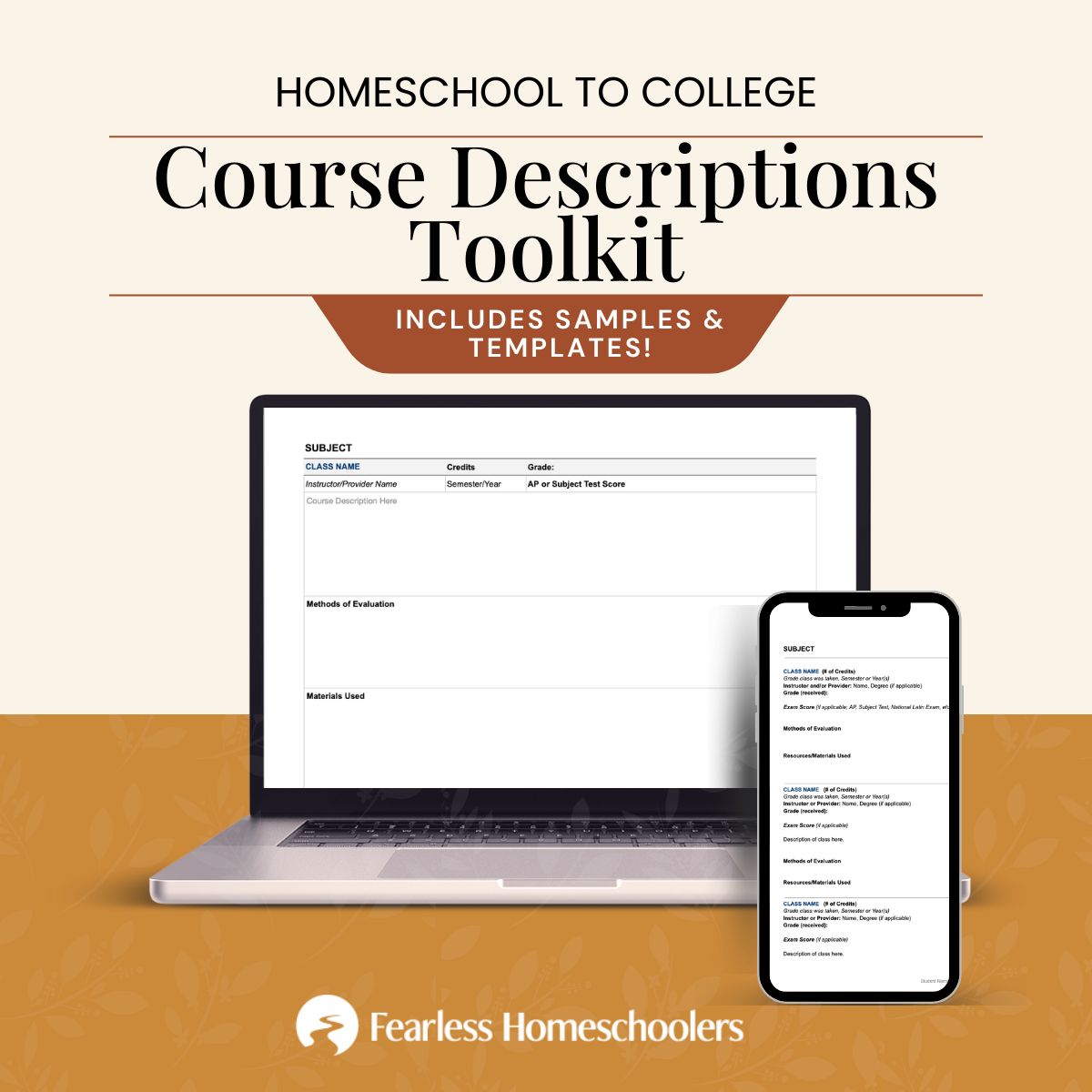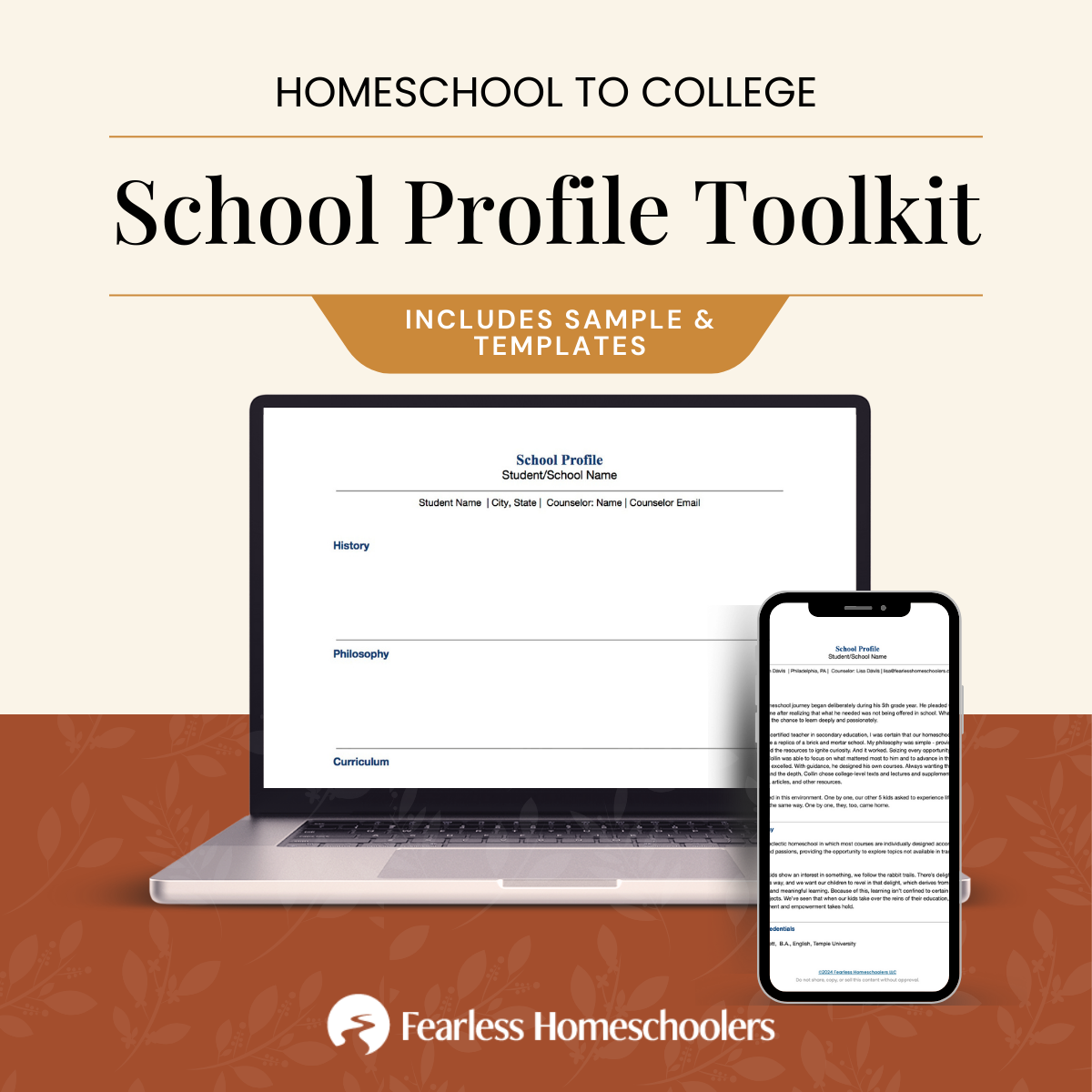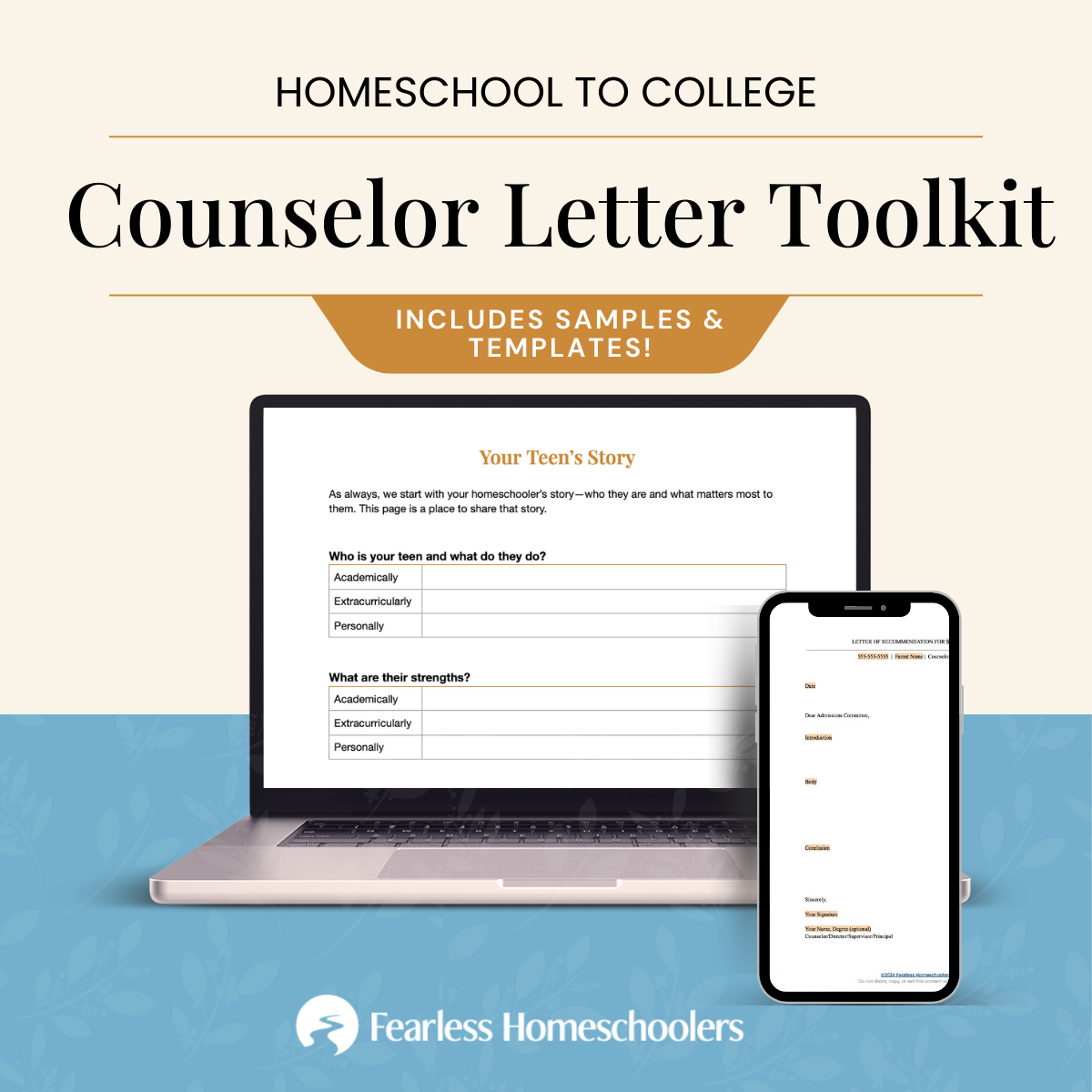How to Show Colleges That Your Homeschool GPA is the Real Deal
“Let’s change a couple of his A’s to B’s,” she told me.
“They’ll take his homeschool transcript more seriously.”
I could feel the blood rush to my face.
I sighed. Or was it more of a grunt?
This wasn’t my first rodeo.
Time and time again, I’ve seen homeschool parents worry that colleges won’t take their education seriously.
And what’s their first inclination?
To lower a homeschool grade to make things look more “realistic.”
Ever been tempted to do the same thing?

Worried that colleges won’t take your homeschool transcript GPA seriously?
Don’t Lower Your Homeschool Grades or GPA
1. It’s not fair - to your homeschooler. Did they earn that A - fair and square? If so, give them what they earned. Don’t diminish their hard work.
2. It’s not fair - to you. Was it a class you taught? Is that why you worry? If your homeschooler earns an A based on your methods of evaluation, good for you! Don’t diminish your hard work.
3. It’s not an honest representation of your homeschool. Keep this process as transparent and ethical as possible.
But Please Do This
Do give grades.
Some homeschoolers choose to give pass/fail marks because they can’t imagine a college taking a homeschooler’s grades seriously. I would advise against this in most cases because your homeschool transcript will be compared to traditional transcripts. In addition, colleges use those grades for academic scholarships - and you don’t want to miss out on those.
Use my online calculator and calculate the GPA for your homeschooler!
Here’s the Problem
There’s an expectation of homeschoolers to do more and show more.
I get it.
It’s difficult for an admissions committee to know what kind of education their homeschool applicant really received.
Normally, admissions folks know how a brick and mortar student compares within the context of their school. They’re very familiar with the student profile of that particular school. With a homeschool situation, however, they’re missing that context, that information.
What You Can Do About It
So the more context you provide schools, the better.
Give them an application package which demonstrates your homeschooler’s intellectual vitality. Make it obvious that the transcript grades reflect a kid who is bright, curious, and engaged - the kind of kid who would certainly get good grades.
Do this by making wise choices during high school and intentional choices during the college application process.
👉 Grab Your Homeschool Transcript Template HERE!
Plan a High School Schedule That Backs Up Your Homeschool GPA
1. Outsource Classes
Your homeschooler can take online courses, community college courses, university courses. Getting a grade from an outside source is a great way of providing validity.
2. Use Tutors
Online tutors are abundant these days. So are in-house tutors. Many of my families use tutors in the high school years, as it takes some of the pressure off of the parent. It can also be a wonderful opportunity to personalize the instruction to the student.
3. Plan for Teacher Recommendations
These should be from outside, academic instructors - not a parent. Many schools prefer two references, so you need to have a plan in place. Teach your homeschooler how to establish and cultivate a genuine relationship with outside instructors. Glowing recommendations from credible instructors provide great insight and context to an admissions committee.
4. Take AP Exams
Whether you buy into the AP game or not, there’s no denying that more selective colleges prefer to see them from their applicants. There are three ways to take advantage of AP Exams.
Take an AP Course.
There are a handful of providers who offer these as online classes. Just be sure that the courses are officially approved by CollegeBoard or it cannot be listed as such on the transcript.
Self-Study.
One does NOT need to take an AP course in order to take the exam. Even though you cannot list the course as AP on the transcript, the score will be considered evidence of the student’s capability.
Create your own AP Course.
Yes, homeschoolers have the same opportunity as a school teacher. Your syllabus must be approved by CollegeBoard.
5. Consider Independent Studies
Does your homeschooler immerse themselves in a particular subject or project? Create some kind of output for this study - research, paper, presentation, contest, etc. Count up hours spent and be sure to include in the college application or portfolio.
6. Enjoy Extracurriculars/Contests/Competitions
Can your student show a depth of knowledge or talent in a particular subject just by being part of an extracurricular? Check out math competitions, writing contests, science olympiads, foreign language competitions.
7. Take SAT or ACT Exams
The reality is that many schools still put a lot of weight into these scores. Test prep can boost a score, so do your best in backing up strong courses and strong grades with a great SAT and ACT score.
How You, the Counselor, Can Back Up Your Grades
As the homeschool counselor, you have the perfect opportunity to put your student’s education in the best possible light.
Take care in creating a thorough and professional transcript, school profile, counselor recommendation, and course description list. The effort with which you compile all elements of the counselor’s section of the application is a powerful way to affirm the way you approach your homeschooler’s education.
Transcript:
This is a one page document which includes grades, semester, yearly and cumulative credits, and GPA. Make this clear and simple to read. Some parents choose to include test scores on the transcript.
👉 Grab Your Homeschool Transcript Template HERE.
Course descriptions:
This document describes courses in detail. For each course, list instructor, provider, credits, grade, description, method of evaluation, materials used, and textbook ISBN numbers.
👉 Get more insider tips, samples, and a template with the Course Descriptions Toolkit! Grab it HERE!
School Profile:
This document describes your homeschool. In it, you’ll explain your homeschool history, philosophy, educational providers, and grading policy.
👉 Get more insider tips, samples, and a template with the School Profile Toolkit. Grab it HERE!
Counselor Recommendation Letter:
Ah, the counselor letter. Sometimes considered the most difficult part of the counselor tasks (but the most rewarding!), this document provides the ideal opportunity to introduce your student and highlight their qualities that are found nowhere else on the application.
👉 Grab the Counselor Letter Toolkit HERE.
How Your Homeschooler Can Back Up Their GPA
Interviews.
Schedule interviews with all colleges that provide them. Even if a school says “recommended” we all know what that means. Interviews are just conversations - but conversations that breathe life into a homeschool applicant.
Essays.
Start early, revise often. A well-crafted essay can reveal a lot about an applicant. Take the opportunity seriously when choosing the topic and writing about it.
Work Samples.
Some schools want to see work samples from the student. Hold on to graded essays and lab reports. Your homeschooler may need to include them in the application.
What You Need to Know
I can give you all the tools I have in my toolbox.
I can give you tons of practical strategies and tactics as you homeschool high school and fill out the college application.
But what I can’t give you is something only you can give yourself…
Many homeschoolers fail to do this
Trust that your homeschool education IS enough.
How will colleges take your homeschool seriously if you don’t take your homeschool seriously?
It’s time to own your role.
You are enough. And so is the education you gave your teen.
Want More?
- How to Keep Great Homeschool High School Records
- The Ultimate Guide to Homeschool Credits on Your Transcript
- 3 Things Colleges Want on Your Homeschool Transcript
- How to Create a Transcript Colleges Love
Your Turn
Any other ideas for backing up homeschool grades? Share in a comment below!







